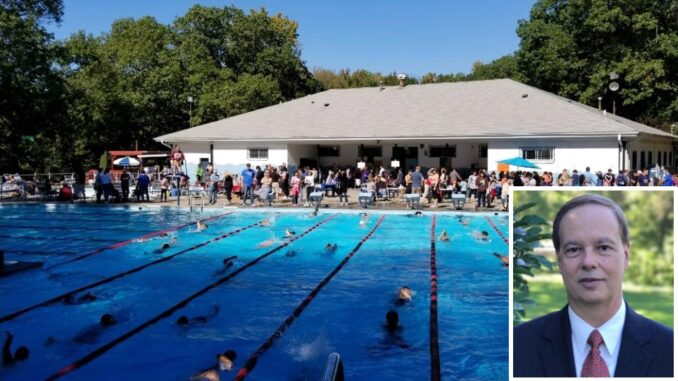
TOWNSHIP OF WASHINGTON—A new environmental investigation to determine the extent of soil contamination by polychlorinated biphenyls (PCBs) and pesticides at the former swim club is estimated to cost nearly $78,000, according to a pre-demolition survey by Boswell Engineering. The survey revealed the presence of PCBs and pesticide contamination on the site.
Councilor Michael Ullman raised the issue of how much the township should invest in the cleanup, citing the $77,800 cost for Boswell’s study, which will include an estimate for site remediation. He asked fellow council members where they would “draw the line in the sand” on the financial commitment required for the cleanup and potential site improvements.
Mayor Peter Calamari responded that the township might receive up to 75% reimbursement of remediation costs through NJDEP grants.
In addition, Boswell has requested $7,500 from the council to complete a grant application to the NJDEP, seeking funding to address the contamination.
Mayor Calamari noted there were “four funding sources” that could potentially support the PCBs study and grant application, including an NJDEP grant and the local Open Space Trust Fund. However, the council did not take any action on the study or grant proposals.
Council President Michael DeSena emphasized that site remediation must take priority before any development plans, such as the proposed “great lawn” design, move forward. He stated that securing Boswell’s cost estimate for the cleanup is essential, calling the PCBs issue a “Pandora’s Box” that has been opened.
No preliminary estimates for the cleanup of PCBs and pesticides were discussed, but officials acknowledged that costs could easily run into hundreds of thousands of dollars, depending on the extent of contamination.
At the Oct. 21 council meeting, Calamari also reported that the Boswell pre-demolition survey found asbestos, lead-based paint, and universal waste on the site. He said the presence of asbestos and lead-based paint was expected due to the swim club’s age.
Interestingly, two previous reports conducted during the due diligence period before the site was purchased did not reveal any environmental concerns. In his press release, Calamari noted that two environmental investigations by Lisko Environmental detected no evidence of PCBs, pesticides, or other hazards. Only the recent Boswell survey identified contamination.
The mayor’s Oct. 16 press release is posted on the township’s website under Swim Club Property Recreation Plan.
Calamari suggested that, years ago, pesticides may have been mixed with used oil and applied to properties to control mosquitoes. He stressed that no township employees were involved, and the applications likely occurred many years ago, before the township acquired the site in April 2022.
The Boswell report also identified chemicals in the former swim club’s pump house, which must be properly disposed of. DeSena requested that these chemicals be removed and that signage be posted warning of potential hazards. Calamari confirmed that this would be done and that no trespassing signs would remain on the security fence surrounding the closed swim club.
DeSena further asked that the full Boswell Pre-Demolition Survey be posted online to keep residents informed. Calamari said residents could direct questions to administrator Mark DiCarlo for further follow-up.
In an Oct. 16 press release, Calamari shared that soil samples taken from the grass area around the swimming pools indicated PCB levels exceeding 50 parts per million (ppm), which required mandatory notification to the NJDEP. Boswell Engineering made the notification, and the NJDEP issued the township a “Suspected Hazardous Substance Discharge Notification.”
Calamari emphasized that the administration’s top concern is safety, explaining that the PCB in the soil is not airborne. Any potential hazard would only come from direct disturbance of the ground.
The contaminated area is secured by two fences with locks and chains, and DPW workers have been instructed not to enter the property.
Ullman also asked whether the township could seek to “claw back” funds used for the site purchase to help cover soil remediation costs. Calamari said that option is being explored.
Several council members raised concerns about the possibility of PCBs spreading or contaminating groundwater.
Ullman suggested the township take a more comprehensive approach to soil contamination, citing two recent incidents.
Calamari said he would discuss the issue with Boswell engineers.
